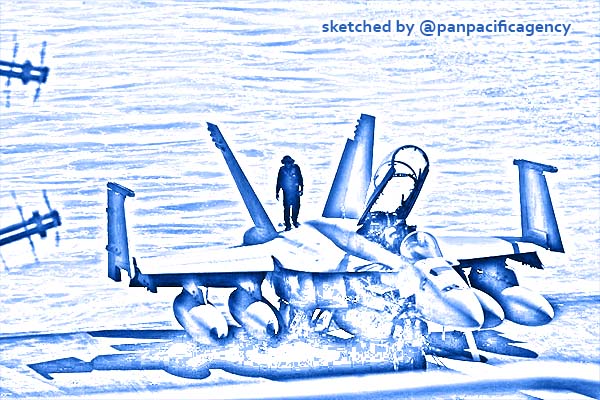US hails Pakistan’s role in Afghan peace process

A sailor inspects atop an FA-18 hornet fighter jet during a routine training aboard US aircraft carrier Theodore Roosevelt in the South China sea on April 10, 2018. The carrier group Theodore Roosevelt is transiting through the South China sea on its way to the Philippines from Singapore after participating in Operations Inherent Resolve (OIR) and Operation Freedom's Sentinel (OFS) in Syria, Iraq and Afghanistan. (AFP/Ted Aljibe). Sketched by the Pan Pacific Agency.
ISLAMABAD, Oct 9, 2020, The Nation. US Special Representative for Afghanistan Reconciliation Zalmay Khalilzad and Commander Resolute Support Mission in Afghanistan General Austin Scott Miller discussed with Chief of Army Staff (COAS) General Qamar Javed Bajwa peace and stability in the region, Pak-Afghan border management and current developments in the Afghan peace process, The Nation reported.
Ambassador Khalilzad and General Austin Scott Miller called on Chief of Army Staff (COAS) General Qamar Javed Bajwa at GHQ in Rawalpindi on Thursday.
According to the Inter-Services Public Relations (ISPR) Directorate, peace and stability in the region, Pak-Afghan border management and current developments in Afghan peace process were discussed during the meeting. Ambassador Mohammad Sadiq, Special Representative for Afghanistan was also present in the meeting. The ISPR said that the visiting dignitaries appreciated positive role being played by Pakistan for Afghan peace process.
The US peace envoy for Afghanistan had also visited Pakistan last month as he has been playing an important role in reconciliation talks between warring Afghan parties. Pakistan has been playing a key role in the Afghan peace process and striving for a political settlement to the decades-old conflict raging the country.
Meanwhile, US Ambassador Zalmay Khalilzad yesterday thanked Prime Minister Imran Khan and Chief of Army Staff Qamar Javed Bajwa for their help in advancing the Afghanistan peace process.
Ambassador Khalilzad and General Bajwa agreed that intra-Afghan direct negotiations were a historic opportunity for achieving peace in Afghanistan and for the region. They also had agreement that opportunity must not be lost and past mistakes should not be repeated, said a US embassy statement.
“They discussed the efforts countries who support the peace process can undertake to help Afghans reach a political settlement and to implement it. They also discussed Prime Minister Khan’s upcoming visit to Afghanistan and the roadmap that would guide Pakistan-Afghanistan relations after there is a peace agreement,” it said.
Ambassador Khalilzad, General Miller, and General Bajwa affirmed the need for a significant reduction in violence in Afghanistan as peace negotiations between the two sides move forward, the statement said.
Earlier, Zalmay Khalilzad said he expected the country’s peace process to conclude in months and not years.
In an interview, the envoy also said that the current scale of violence in Afghanistan was not acceptable, and that it was strange how the Taliban had stopped attacks on foreigners but continues attacking Afghans.
“The Taliban attacks are not taking place against the foreign forces. We are happy with that, but, on the other side, the war continues against Afghans,” he said.
He added: “These principles have been accepted by all and (the US-Taliban agreement) lays a major and an important foundation.”
Khalilzad said there was a “high level of violence, violence needs to be reduced, a commitment has been made regarding this issue and we want that commitment to be honoured.”
The opening ceremony of the intra-Afghan talks was held in Doha on September 12. So far, seven meetings have taken place between their contact groups to discuss procedural rules for the talks.